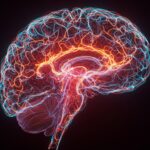A new study published in The American Journal of Drug and Alcohol Abuse has discovered that sleep problems may be a key factor in how cannabis use affects memory, highlighting the importance of sleep quality for cognitive health.
THC, the psychoactive ingredient in cannabis, has been linked to memory impairments by disrupting brain regions like the hippocampus, which is essential for learning and recall. At the same time, long-term cannabis use has been associated with sleep disturbances, such as reduced REM sleep and deep sleep – both of which are necessary for processing and storing memories.
Since both memory and sleep are separately known to be affected by cannabis, a research team led by Tracy Brown from the University of Texas at Dallas in collaboration with colleagues in Amsterdam wanted to explore how these two factors are connected. They also wanted to investigate whether men and women experience these effects differently.
Brown and colleagues analyzed data from 228 adults aged 18 to 31 years old, including 141 people diagnosed with cannabis use disorder (using cannabis over 5 days per week) and 87 who did not use cannabis frequently.
Participants completed self-reported sleep assessments and underwent cognitive tests that measured their memory abilities. One test was on visual memory, which is the ability to recall and recognize objects after seeing them. Verbal memory was also examined, which is the ability to remember words and language-based information.
The results highlighted a clear pattern: people with cannabis use disorder had worse sleep quality, and this in turn was linked to poorer performance in visual memory tasks. In other words, sleep problems appeared to be the reason why cannabis users struggled with remembering and recognizing visual information.
However, the study did not find the same link between sleep and verbal memory. This suggests that cannabis use may impact different types of memory in different ways.
Surprisingly, the researchers also found that sex did not play a significant role in these effects. Despite previous studies suggesting that men and women experience sleep disturbances differently, both sexes showed similar patterns in this study.
“These initial findings suggesting a role of sleep between cannabis use disorder and memory function are important to consider for the optimization of cannabis’ potential therapeutic effect on sleep, while mitigating potential harm. These initial findings also indicate that sleep may be an important entry point to improve cognitive function in those with cannabis use disorder,” the authors concluded.
Although this study provides valuable insights, it does have some limitations. For example the study was of a cross-sectional design, meaning it only looked at data from a single point in time, making it impossible to determine cause and effect.
The study, “The Role of Sleep in the Link Between Cannabis Use and Memory Function: Evidence from a Cross-Sectional Study,” was authored by T. Brown, R. A. Ackerman, E. Kroon, L. Kuhns, J. Cousijn, and F. M. Filbey.




